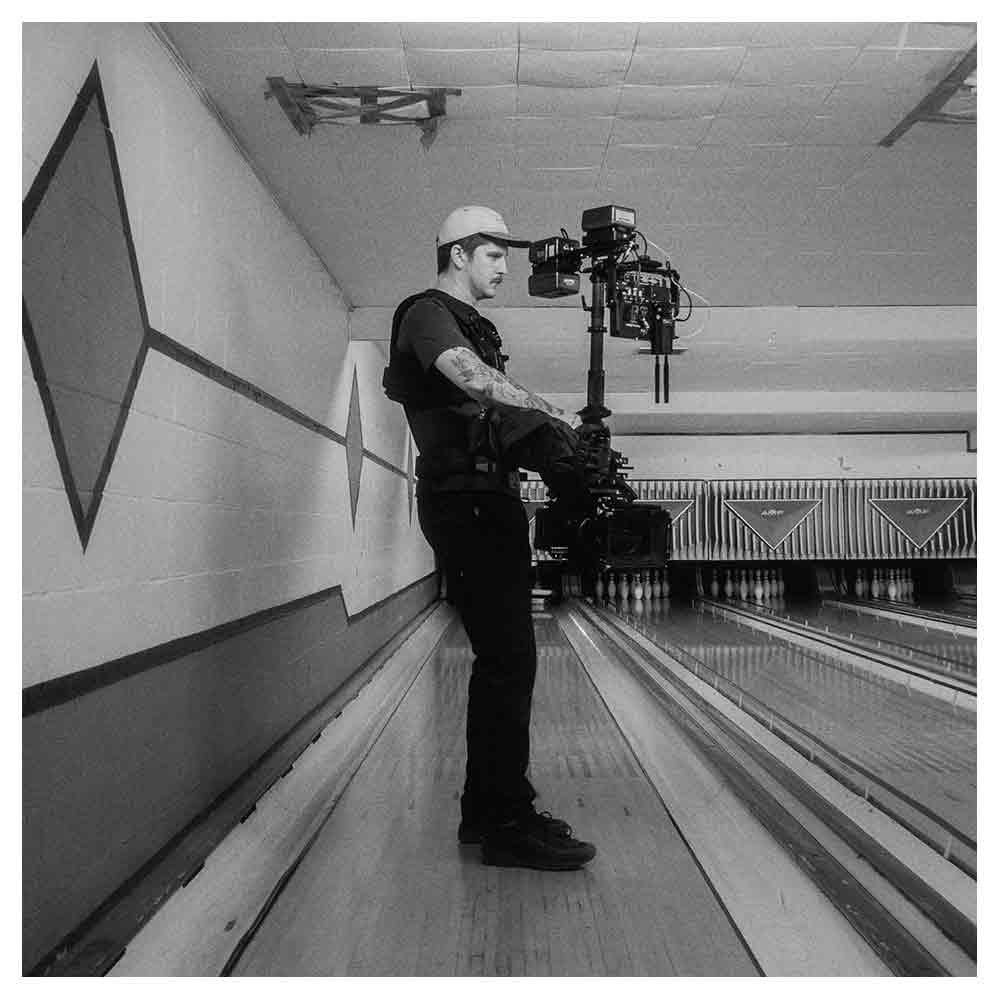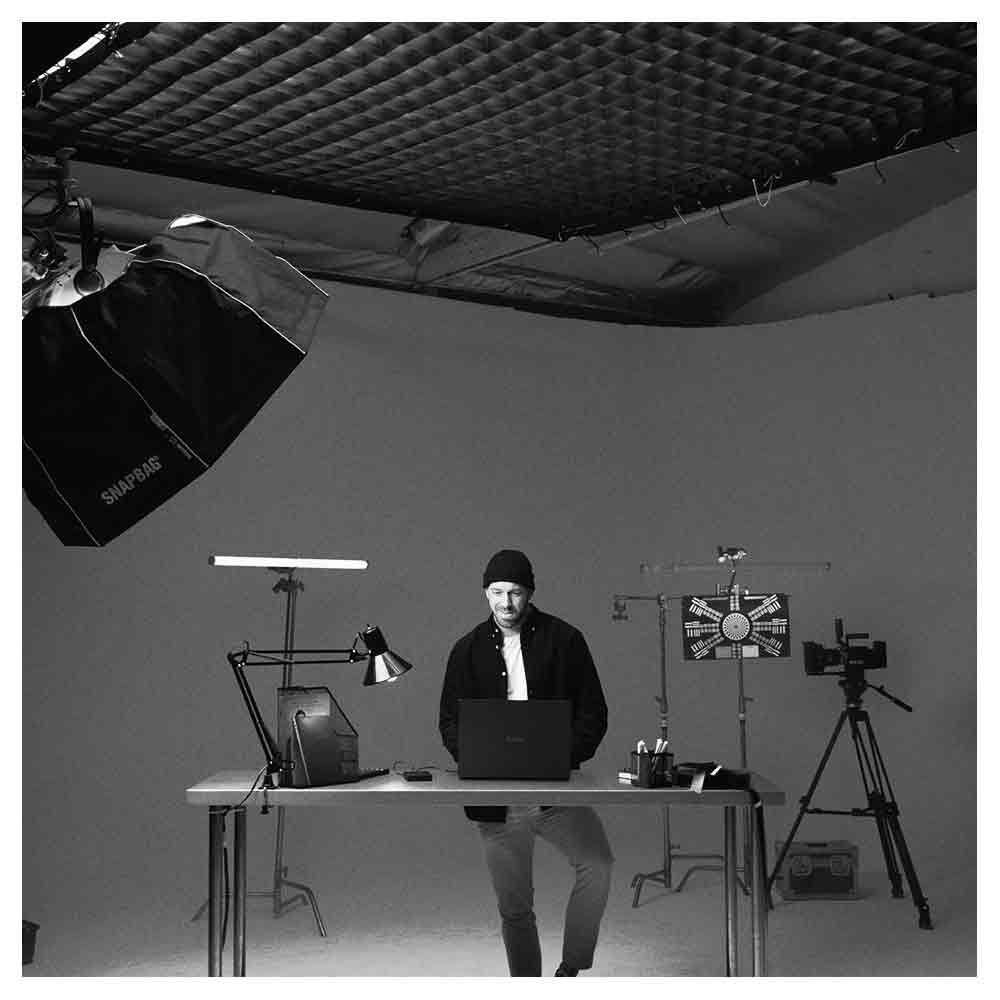How To Get More Clients As A Filmmaker?
For a long time, I thought getting new clients as a freelance filmmaker was solely done via word-of-mouth referrals. I believed that if I had a big network, drank lots of coffee with potential collaborators, and shared my occasional new work with the world, new clients would contact me based on my flashy portfolio.
But unfortunately, with so many filmmaking competitors doing the same thing, this approach wasn't getting me the results I wanted.
When I began selling digital products on my website last year, I learned that creating my own products was just the first step. Finding and convincing people to buy my products was a different ball game. I started researching marketing & sales techniques to understand how this new aspect of the job worked.
After reading many books and watching many marketing and sales guru videos, I concluded that whether you sell a product or a filmmaking service, you need a proper marketing strategy to rise above the noise and get new clients.
In this article, I wanted to share my marketing discoveries with you. On top of that, I'll share a few of my thoughts on how to market yourself as a freelance filmmaker via a five-step marketing beginner's guide so you can get more clients, make more money, and grow your business.
Table of contents:
Why is marketing for freelance filmmakers important?
Before we hit the ground running, let me explain why marketing is important by approaching it from a different perspective…
A different perspective on marketing
When you sell ice-cold lemonade in the neighborhood during the summer and are the only lemonade stall around town, the chance that people will buy lemonade from you is pretty high.
But when one hundred people in the same neighborhood also start selling lemonade, you suddenly have to find ways to compete with them to convince people to buy lemonade from you instead of your competitors.
Of course, you can evolve your recipe, offer different flavors, or try to beat your competitors with a lower price. But it's only a matter of time until the others start taking the same approach. So, what other options do you have left? Exactly, good old marketing!
As a small business owner won't be able to overpower the other lemonade stands, you must be more innovative in educating your audience about why they need to buy your product instead of your competitors. Now, let's switch back to making films instead of lemonade.
Unfortunately, you’re not alone anymore.
Not so long ago, only a few people could cut a movie or knew how to handle a camera. But with today's technology, everybody can write, film, edit, and distribute a feature film with their smartphone. Suddenly, you are not the only lemonade stand in the neighborhood anymore!
So, you must improve at marketing yourself to get new clients and make customers come to you instead of your filmmaking competitors.
But how do you do that as a small business owner? What do you need besides a flashy website, a logo, a showreel, and sharing your occasional new work via your social media outlets to get new business?
Well, let's start at the beginning…
My old-school way of marketing
Initially, I was marketing myself based on the idea that it's not about what you know as a filmmaker but who you know.
I thought that building relationships and knowing lots of people would eventually get me new clients, because the film business is essentially a people's business. Meaning: people like to do business with people they know and trust.
Networking my ass off
And to get people to know and trust me with their production budgets, I thought I had to send many introduction messages, meet many industry people, and drink liters of coffee with potential clients and collaborators who might award me future opportunities.
As you can imagine, this was time-consuming, not scalable, and had zero job guarantees.
I discovered the real downside of this approach was that, at the end of the day, people generally didn't care about what I had to offer them if it wasn't helping them at that particular moment.
It was nice to meet new faces, but it wasn't a good time investment for 95% of the time because it didn't result in new clients or business relationships.
A handyman approach to getting more clients
I more or less felt like a handyman knocking on as many doors as possible, just in case someone needed my help to fix things in the distant future. Of course, it becomes a numbers game if you regularly knock on as many doors as possible.
At some point, there will always be someone who might need your help, which can make you assume that this approach is the right way forward!
But it takes a long time to find those needle-in-haystack opportunities, and all your hard work comes with zero guaranteed outcome.
Fragile word-of-mouth marketing
Another downside of this 'yeah-we-should-work-together-and-make-beautiful-awesome-looking-films-in-the-future' approach was that the people I had invested my time in often switched jobs or started doing something completely different.
The bottom line, I lost my connection to a particular business and had to start all over again.
For some reason, this fragile word-of-mouth marketing model is still what most filmmakers rely on today. It's OK if that's part of your marketing strategy, but I believe we shouldn't rely solely on it.
But what should you rely on, you might ask?
Let's dive a little deeper…
The essence of good marketing
While studying proper marketing techniques, I discovered that I had to make a fundamental mindset shift to become good at marketing myself and my filmmaking products.
I had to understand that filmmaking is not solely about making the most stunning results possible. Filmmaking is all about problem-solving.
To be clear, I’m not talking about solving the problems you encounter during pre-production, production, and post-production. That’s a totally different kind of problem-solving.
To understand the problem-solving I’m talking about, we must look at filmmaking from a different perspective.
Marketing is always a means to an end.
Although for us, the filmmaking experts, making ideas come to life with a camera is all about doing that in the most stunning ways possible. But for the people that hire us to do that for them, the end products we create are just a means to an end.
The film, commercial, tv show, fashion film, documentary, or whatever project is always part of a bigger business plan.
In 99.9% of the cases, the company that commissions you the opportunity or funds the project wants to create revenue (by selling a product or service), and the film you’re being asked to make is just a tool to help your client achieve that goal.
Different business models.
For example, the business model of a TV station is to charge big numbers for advertisements. That’s why they want engaging films, series, and TV shows to offer a large audience to companies looking for a broadcasting platform for their commercials.
The more people watch the content on the TV channel, the higher the advertising fees will be. That’s why every second during the commercial break of the Super Bowl costs SO MUCH money. The commercial reach of the TV station during that time is just INSANE.
For a company that wants to reach potential customers to sell their latest product or service, one of those Super Bowl commercials can be a marketing tool to help them achieve that objective.
When music artists want to build an audience for their music so they can sell their music and perform, a music video can be a tool to help them achieve that goal. The projects we, as filmmakers, create are products for different business goals.
The real problem solving
What is the problem-solving approach in these cases, you might ask?
The problem is that these businesses that commission us for the job might know a lot about the goals they want to achieve, but they don’t know how to create a beautiful film that helps them achieve those goals.
They don’t have the time, tools, skills, or network to pull it off. That’s why they come to you, the filmmaking expert, to help them solve that problem.
Once I understood that every successful business on earth essentially exists because it helps solve someone else’s problem via a product or service, I figured out the essence of good marketing—explaining how your service (or your product) can help people solve a specific problem!
How to market yourself as a freelance filmmaker?
Now you understand that everything revolves around problem-solving, the next question would be, how do you market yourself as a freelance filmmaker to get more clients?
The answer is simple: promoting yourself as a problem-solving service business for a specific client with a specific type of problem! In other words, by promoting yourself as a specialized filmmaker with a specific skill or style for a particular kind of project or client at a particular moment in time.
For a long time, I thought that self-promotion was a bad thing. Looking back at it now, I didn't understand how to approach self-promotion the right way and therefore was very bad at it. I was too focused on the business transaction, too focused on selling myself.
To help you understand how to promote yourself the right way, I've outlined a five-step marketing guide below that you can execute step by step based on my research and the results I’ve gained through my marketing strategy since I started selling digital products.
Step 1 - Specialize
When you encounter a problem in life, you probably want to find the best possible expert to help you solve it. Guess what? It works the same for filmmaking!
Find a niche
In this business, people want to work with the best specialists to minimize the risk of failure so they won’t lose their money or their job. To establish yourself as the best specialist for a particular project, I advise you to specialize in a specific niche (market, genre, style, or skill).
I know first-hand that it’s hard to choose to specialize in one particular niche because saying ‘yes’ to one specific kind of work means saying ‘no’ to the rest. And because many filmmakers, my past self included, live like starving artists, that decision comes with the potential loss of revenue.
Experiment first
That doesn’t mean you shouldn’t experiment and try different kinds of work first. You have no established track record when starting as a filmmaker, video content creator, or whatever title you’d like to give yourself.
Getting new clients who pay you for your services might be difficult because it’s hard for them to judge if you are the right problem solver for them.
So, being a generalist instead of a specialist is okay. Once you’ve discovered the kind of work you like to create, specialize and try to be as specific as possible. For example, instead of focusing on real estate videos, label yourself as someone who only makes race drone videos for luxury real estate.
The more you specialize, the easier it will be for clients to label you as the best problem solver for their problems and give you a call.
No specialization means more competition.
Over the years, I’ve seen so many filmmakers label themselves for all kinds of projects as director, writer, cinematographer, editor, gaffer, sound guy, you name it.
When you’re looking for a great writer to help write a short film script, who would you contact to get the best script possible? Someone who has dedicated their entire career to screenwriting or a generalist who does a bit of everything? I’d say pick one profession for one niche and do just that. So many generalist filmmakers will be your competitors if you don’t specialize.
The earlier you can start specializing yourself, the better you’ll become at that particular skill, the greater your track record (a.k.a. portfolio), and the easier it will be for clients to find you and give you a call. And as a bonus, the higher prices you’ll be able to charge without raising eyebrows.
Tip: Be sure to specialize in something that you like, something that you’re good at, something that matches your previous work, and something where money is to be made. Don’t specialize in a market, style, genre, or skill nobody will pay for.
Extra Tip: If you want to read a good book about the importance of specialization for creatives, I highly recommend reading 'The Win Without Pitching Manifesto' by Blair Enns.
Step 2 - Define your ideal client
Once you’ve specialized yourself, you must realize that your filmmaker services won’t appeal to everyone, and that’s ok. There will only be a specific kind of client willing to pay for your offer.
The next step in this guide is to understand the clients who would best need your services. The better you understand who is willing to pay for what you offer, the better you’ll understand how to market yourself to that specific client.
Ask yourself lots of questions.
What helps in defining your dream client is asking yourself the following questions:
What kind of people or businesses would need your product or service?
What is their age, gender, location, language, and education?
What goals do they want to achieve?
What problems do they face?
How can you help them solve those problems?
What unique solutions do you offer?
Where are they looking for solutions?
Once you’ve formulated your answers, you’ll better understand who to target with your marketing. And when you know who to target, you’ll better understand how to target them.
Tip: Profiling your dream client, focus on clients with budgets that match your ambitions!
Step 3 - Build a portfolio website
Now you know your target audience, the next step is to show them that you can offer them a solution to their problems. You don’t just need a showreel for that.
A showreel might show your best shots, but it doesn’t give a good understanding of who you are, how you work, and the kind of productions you’ve worked on in the past.
One central platform to market yourself
If you want to show potential clients that you are the right problem solver for them, you need one central platform to showcase your entire track record that helps to establish your credibility.
Nowadays, many people think you should showcase your portfolio via social media. But I think social media is not a replacement for a portfolio website.
The downside of social media platforms is that other companies own them. Other people decide how these platforms look and function and what you can display.
You can be banned and lose your storefront if you share something against the platform's guidelines.
Social media is just a tool.
I always considered social media platforms a tool to help promote your personal brand and a simple way for potential clients and collaborators to contact you.
It's better to display your work on your own online platform, a.k.a. your portfolio website, where you define how the platform looks and what you're allowed to show and use social media to lure people to that platform.
Build a website yourself.
You no longer need to be a website programmer to build a beautiful website. You can create a website using platforms like Wix or Squarespace, website builders especially designed for artists, without knowing how to code.
You can use one of their many templates and sculpt them into something that represents your style and personality.
Remember, clients want to work with the best specialist to help them solve their problems. The faster and easier you can make that assessment for them, the better!
Please keep it simple, give people a clear understanding of what you specialize in and the projects you've worked on in the past, and make it easy for clients to get in touch with you.
Tip: The whole purpose of a website is to establish yourself as a trustworthy problem solver and make it easy for people to get in touch with you.
So please, do yourself a favor and don't act like a celebrity by making it almost impossible for people to reach out to you. Having a clear Call-To-Action button on every page (like the button at the top of my website) linked to a contact page, an email address, or a phone number (that is working) is all you have to include.
Step 4 - Target your dream client
The fourth step of this filmmaker's marketing guide is creating brand awareness. In more practical terms, you need to get as many people as possible on your website by sharing content online.
Create specific content for specific platforms
Don't worry, you don't have to become a social media expert or an influencer.
You have to create ways to drive people to your platform where you have displayed your contact details so they can get in touch with you to explore the possibilities of a future collaboration.
Understanding your dream clients' platforms is the best way to approach this. For example, suppose you like to target other filmmakers or production companies to hire you.
In that case, Instagram, Vimeo, YouTube, or even niche Facebook groups might be good options for posting digital marketing content regularly.
If you desire to create wedding content, Pinterest is your go-to platform. LinkedIn can be an excellent option if you aim to work directly for corporate businesses. Etc.
But what do you share on those platforms besides the final results you create? In my marketing and sales research, I came across the book 'Show Your Work!: 10 Ways to Share Your Creativity and Get Discovered by Austin Kleon.
Valuable content marketing
In this book, Austin explains the concept of content digital marketing and building a personal brand.
It’s a marketing strategy whereby you generate leads and share not just the final result but also take people along the ride with you by sharing lots of behind-the-scenes videos, making-of photos, and valuable learnings you gained while creating your projects.
For my digital products, I found out many of my dream clients use Google to find answers to their problems.
So, I started writing blog posts about the learnings of my career so far, and I discovered that this value exchange is the big trick in targeting your dream client.
If we care, we share
To lure potential clients and creative collaborators to your platform, you must give them a reason to care. You have to give them something valuable in the form of knowledge or entertainment. Something that builds trust and helps you become an authority in your niche.
To create that value, you can use digital marketing to ensure search engines pick up your content. You can start writing blog posts (like I do), start a podcast, a YouTube channel, a TikTok account, etc.
The options with today's free online social media platforms are endless! Not doing digital marketing because you don't have the financial resources is no longer an option.
My traffic growth
I’ll tell you about my visitor numbers to show you how effective digital marketing is.
Before researching marketing and sales, I had no more than one or two hundred visitors per year to my portfolio website. Fast forward to today, and I now have one or two hundred visitors each week and sometimes even daily!
That results in search engines like Google ranking my blog posts high in their search results and providing me with free visitors! Some visitors buy my digital products linked to these articles, and my blogs (accessible 24/7, 365 days a year) have turned my website into a self-sustainable factory!
The number of new people who look at my work or my products is no longer dependent on those traffic spikes that only happen once in a blue moon when I promote a new project on my social media outlets. (By the way, I know all these numbers because I track all my website activity using Google Analytics on my Squarespace website)
Trial & error
If you want to become great at targeting your dream clients, try to find situations in your life that represent lessons you've learned along the way that you can share with the world in the form of quality content.
Tell a personal story, something that can't be told by someone else, and become a valuable resource in someone else's story.
I understand that not everyone is comfortable writing blog posts or making YouTube videos, and it might take some time to discover what kind of value creation you like.
But as long as you take that first step and try different options, you will eventually find your voice and a marketing rhythm that suits you.
Step 5 - Be consistent
The final step of this beginner’s guide on marketing yourself as a freelance filmmaker is to be consistent with your content sharing.
Marketing aims to make it easier for potential clients and collaborators to find you instead of your competitors.
It’s only when you constantly share valuable content to expose others to your filmmaking services that you seem more present, which helps to establish trust.
That’s why I keep writing and publishing these blog articles every week. The more knowledge I share for free, the more it adds to the credibility of my products and my credibility as a filmmaker.
The more likely it is that Google will rank my articles higher in their search results and that others will trust me.
It’s a marathon, not a sprint
The downside of marketing yourself and building your online brand is that it takes time. I’ve learned that marketing is a marathon, not a sprint.
This is not a get-rich-quick scam, but hard work and much trial and error. It took me seven months before Google started providing me with my first paying customer!
No matter how you target your dream client, it might take a few months or even years, but I’m sure that if you stay consistent, results will come eventually.
People will find you if you keep going, and you’ll no longer have to invest countless hours in sending introduction messages and sipping away coffee in the hopes that people will like your portfolio.
Conclusion
In the incredibly noisy world called 'the internet,' it's difficult to attract new clients when you're not sharing what you do with people.
So to get more clients, especially the kind of clients you want, you will need to demonstrate that you're the kind of person a client would like to work with, which involves promoting yourself.
Understand your value first.
But before you can promote yourself and your services to other people, you first need to understand who you are and what you have to offer.
You need to explain why other people need to hire you based on the value you have to offer. In short, you need to be able to say, "I can help you achieve X by doing Y."
Once you understand what your brand stands for and the value you can offer to other people, you will better understand what your marketing should include.
Self-promotion doesn't have to be bad if you don't try to sell something to somebody.
Just share valuable insights into how you work, how you solved the problems you encountered on your path, and the lessons you've learned along the way.
The power of repetitiveness.
Marketing is all about making the decision to hire you or buy something from you as easily as possible by removing friction and establishing trust. If potential clients don't trust you with their budget, they won't hire you.
You reach that point by reaching a person or business several times, giving away value, and repeatedly exposing them to your product or service.
The better you can make potential clients understand who you are and what problems you can help solve, the easier it's for them to hire you.
Make sure to be honest, authentic, and be you. You are the only YOU in this world.






























